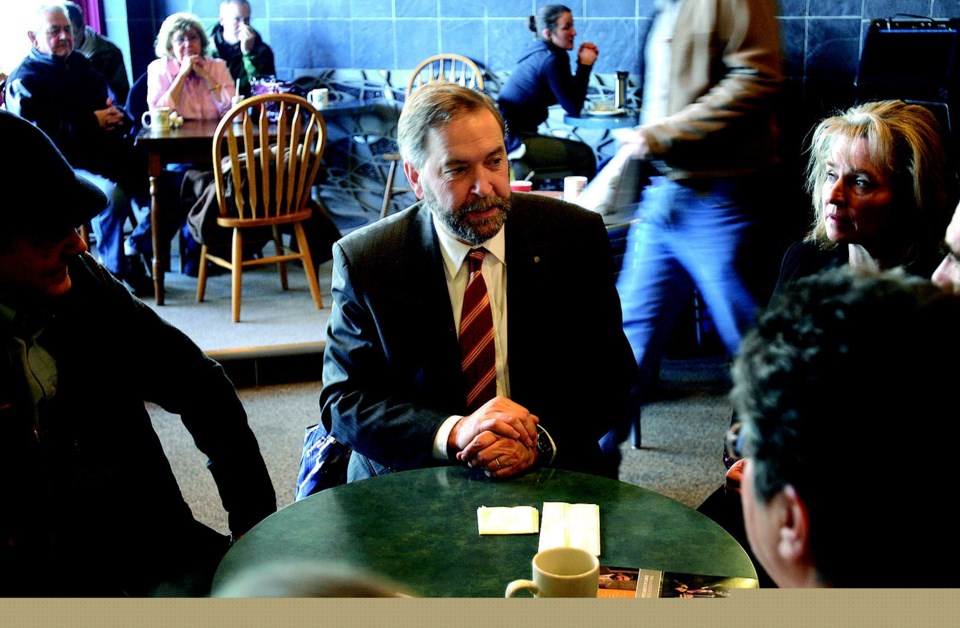A second candidate for federal NDP leader made a stop in Prince George.
Last week it was Nathan Cullen, who is a northern British Columbian so perhaps less surprising than Monday's visit by longtime Quebecois Member of Parliament Thomas Mulcair.
Others in the field of eight are rumoured to be considering a stop here as well.
Although he is bilingual sans accent, he feigned a thick French tone when he explained "I have a special connection to Pranse Zj-orzje," and pointed out his godmother in the room, local artist Monique Wyse. He was able to get in so family visiting while also campaigning.
Mulcair received and responded to questions, including one in French that he answered en francais and then translated to English. It pertained to language protection and he responded that both official languages need to be promoted wherever they are underrepresented, implying that English should not be ostracized in Quebec and French should have opportunities to thrive in anglo-dominated places like Prince George.
He also made his policy stance known on a number of issues like a staunch opposition, based on ecosystem risk and by extension an economic risk, to oil tankers off B.C.'s west coast, which would negate the building of the proposed Enbridge pipeline through this area; and a cap-and-trade fiscal plan he claimed would result in $20 billion in revenues to pay for carrying out social programs and debt reductions expected by Canadians.
His other positions: total opposition to the practice of "fracking" in the natural gas industry until studies were complete on the chemical cocktails used for this, plus the groundwater and seismic implications; a desire to fight crime with a fact-based judicial system and not what he called "the Texas model, which is a failed system" being touted by the governing Conservatives; and his renewed anger over proposals to privatize elements of Jasper Park as was once proposed in Quebec when he was the provincial minister responsible.
"I resigned from cabinet over that," he said.
His main political concerns were about political engagement, he said. He was worried that his generation was at least partially responsible for a lack of interest in politics by today's youth. Young people are seemingly less engaged these days in volunteering, organizing and running in political campaigns, as well as in voting.
He said Quebec was the place where the federal NDP had to perform best, in order to sustain the groundswell of new NDP MPs swept into Parliament when the voters there suddenly turned away from the previously automatic provincial favourite Bloc Quebecois.
UNBC political science teacher Jason Morris said this was perhaps ironically the province Mulcair needed to pay the least attention to, for his own leadership fortunes.
He is already popular there, winning elections in Quebec long before the unexpected landslide this past campaign. Also, said Morris, Quebec is not the electoral battleground for the leadership race.
"For the NDP leadership convention, there is no regional representation," Morris said. "It is 'one member-one vote' so it is not mathematically smart for any candidate to put a lot of energy there where there are few actual party members. British Columbia has about one-third of the entire national party membership."
Mulcair agreed. "B.C. has the largest number of NDP members, and that is why people are rightly paying attention to you."
As official opposition in Parliament, Mulcair said the stakes were very high for the NDP so the leadership race had unprecedented pressure.
If the party did not do a good job of both opposing government problems and offering a valid alternative, the party's loftiest election results ever would simply not be repeated.
"It might also explain why so many people are interested in the leadership job," Morris said.
The top NDP job was typically one focused on idealism, but now there is real power in Ottawa so political opportunism was also a factor.
When asked by The Citizen who posed the biggest threat, either the federal Conservatives in government or the federal Liberals in rebuilding mode, Mulcair replied "I think it is the NDP that poses the biggest threat to both of them. [Canadians] voted for us, they wanted to see what we can do, so we have to shake them up with some real action on the important issues."
No other Prince George visits by federal NDP hopefuls have been officially announced. The new leader is chosen on March 24.



